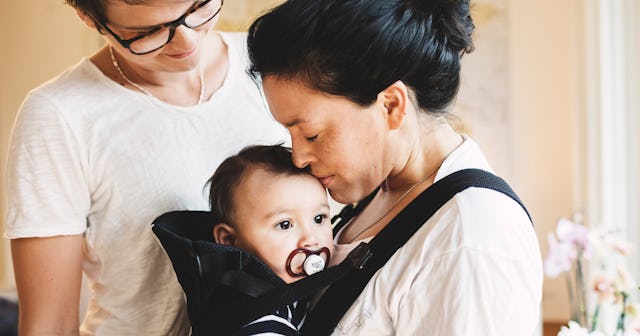My Kids Might Meet Their Sperm Donor Dad Someday

Every year at the beginning of June and until Father’s Day, I’m very aware of people’s curiosity—sometimes born out of anxiety—and attention to the fact that my kids have two moms. People wonder two things: Is Father’s Day reserved for me or my former partner? And what do the kids do for Father’s Day?
The answers are no. And nothing.
My kids’ biological mama feels very much a mother and wants to be celebrated on Mother’s Day. Before I identified as nonbinary and changed my pronouns from female to gender neutral ones, I identified as a mother too. I still do. Hearing my kids call me mama carries so much affection that unless I am writing about myself and using that “feminine” word to describe myself, it is just a term of endearment. While I am both female and male, I have never called myself a father and I won’t. And short of making a classroom gift for their Pop-Pop, my kids don’t put too much stock into Father’s Day because they don’t have a father; they have a sperm donor. But with their creation came the possibility that someday they might meet someone they call Dad.
While I don’t think that a child needs both a mother and father to have a healthy, well-adjusted life full of love, I do believe kids need answers. And when looking at the sperm donor options on the website of a reputable cryobank, my partner and I narrowed the search to donors who were willing to meet the offspring their DNA helped to create. They are called open donors. They are men who remain anonymous until a child created with the use of his sperm requests to meet him. He may always remain anonymous, though. My children may never want to meet the man who added a layer of foundation when building our family. But I wanted them to have the option.
Silvia Trigo/Pexels
Growing up, navigating life, and figuring out who we are is hard enough without feeling like we don’t have the information that makes us complete. I am not saying a child with same-gender parents is at a disadvantage or in any way incomplete. Not at all. In fact, studies show that students with same-gender parents do just as well as those with different-gender parents. But the truth is that babies are made with a sperm and an egg, and my kids know we needed sperm to make them. I knew there was a chance they would want to know the person who provided that piece of the equation. I didn’t want any of my kids to feel like they had to search too long outside of their home and community to put a face to the one they see reflected back in the mirror.
Wondering what pieces of you are from your biological parent is natural, especially if some of your features or quirks or talents don’t match those of anyone else in your house. If my kids felt any disconnect because of unanswered questions, then it seemed like my responsibility to provide those answers if I could. Having an open donor means having options, not inadequacies. It also means my role as their parent may be enhanced—if all goes well, of course—by the role their sperm donor could play if one or all of my kids choose to meet him. That’s another thing: the rule is that when the offspring turns 18, they can contact the cryobank. The bank then contacts the donor and a first meeting is set up. After that, it is up to the donor and offspring to maintain contact if desired.
There is a chance my oldest child doesn’t want to meet him. Or she will, and then information can be passed down before her siblings reach that 18 year mark. There is a chance one of my twins won’t want to meet him. My kids have donor siblings, and there is a chance some or all of them won’t want anything to do with this. Within the group of six very close siblings who share DNA from a man we have never met, there will be some who want to keep it that way and some who may want to expand our family. Those are relationship boundaries we will need to establish and respect.
I have arrived at a place where I don’t feel threatened by the idea of my kids gaining a positive relationship with their sperm donor. There is also a chance that relationship could become one that does make them think of a dad, their dad, on Father’s Day.
It’s interesting to me, but not surprising, how people get uncomfortable when they find out my kids don’t have a dad. I know it’s because it is ingrained in our heteronormative society that families not consisting of a mom, dad, marriage, and 2.5 kids isn’t normal. Even the most tolerant and accepting people view my family as “different,” and worry or assume that their “normal” will make me or my kids feel less than. I promise you, we are fine. And my kids don’t think yours are any less than for being so “normal.”
Having a house with both a mom and a dad doesn’t mean a child has the security, love, and parenting team they need. And having a house without a dad doesn’t mean they don’t have those things. And not having a dad doesn’t mean one might not show up someday.
This article was originally published on